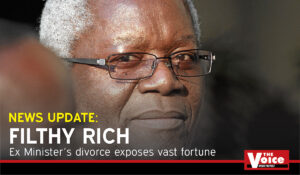The Hunting Trophies (Import Prohibition) Bill debate
Botswana is waiting with bated breath to know the outcome of a potential ban on importation of hunting trophies into the United Kingdom (UK).
The Hunting Trophies (Import Prohibition) Bill which is sponsored by Labour Former Minister John Spellar seeks to ban importation of wildlife trophies.
The bill has secured government backing as it inches closer to becoming a law.
However, the government is seething against the proposed ban with President Mokgweetsi Masisi arguinng that the import ban is not just about wildlife but rather about power dynamics and the echoes of colonialism.
Masisi sees it as yet another attempt to dictate how African nations managed their resources, reminiscent of the days when foreign powers carved up the continent for their own gain.
“Condescending UK trophy hunting import ban is revival of colonial conquest,” said the President during a recent interview with Sky News.
The Voice staffer, DANIEL CHIDA speaks to a number of professionals to get their views on the hot topic.
Professor Joseph Mbaiwa- Director of the Okavango Research Institute
The idea of alternative markets for our trophies has been talked about for a long time, especially Asia.
However, if we don’t see those hunters coming to Botswana now, what guarantee do we have that the market will be there in future despite vigorous marketing campaigns we might mount.
Trophy hunting is done by the rich and there are rich people in UK and EU and USA, we should not lose that market.
It is a fact that the West market is giving us a lot of headache through its animal rights groups and has a lot of restrictions.
We should not give up because of people who are peddling lies about us but take the war to them.
We should do a lot and have PR offices there to educate them because ours is not poaching but controlled hunting.
We should defend our market, the UK market because it is better than starting a new one.
The Asian market is not developed at all and I have never heard of an Asian hunter.
Louis Sibanda- Analyst
Attracting trophy hunters from countries other than the UK could potentially broaden Botswana’s trophy hunting market and diversify revenue streams and reduce dependence on a single market stream.
Countries like America have appetite for trophy hunting and its big business.
Hunting is not only a revenue stream for government but a means of conserving the animals and maintaining them in the right numbers in their natural habitat.
It follows, that hunting, is a conservation policy that government must pursue rigorously and exploit potential ecosystems around it.
Government dependence on the UK for trophy hunters makes the industry vulnerable to exogenous control of the hunting economy.
We must fight for our right to balance human settlements and wildlife conservation.
We have sound conservation policies that have made Botswana the jewel of tourism in the world.
Master Mfundisi- Analyst
Botswana is neo-colonial state mimicking the lifestyles of the British.
Which European country or Americas would step in the shoes of the British, only Asian countries with limited principles on conservation and beneficiation of trophy hunting can do that.
Political corruption will rise as Asian cartels will capture the corrupt elite who make laws.
A critical analysis of the pros and cons has to be undertaken in Botswana.
Most areas and people benefit insignificantly from hunting crusade.
Tourism businesses, hunting operators, government, and well connected local leaders and operatives make much from the trade.
We should not trust these political narcissists and their apologists.
Reaboka Mbulawa – Businessman
If Botswana were to seek alternative hunting markets for their endangered species and bypass the UK in relation to CITIES (Convention on International Trade in Endangered Species of Wild Fauna and Flora) regulations, there could be several political and economic implications.
Politically, Botswana may face backlash from the international community, particularly from conservation organizations and countries that are signatories to CITES.
By bypassing UK and seeking alternative hunting markets, Botswana could be seen as prioritizing short-term economic gains over long-term conservation efforts.
This could damage Botswana’s reputation as a responsible steward of wildlife and natural resources, leading to strained diplomatic relations with other countries and potential trade restrictions.
Economically, seeking alternative hunting markets for endangered species could bring in additional revenue for Botswana’s tourism industry.
However, this would likely come at the expense of the country’s reputation as a wildlife conservation destination, potentially leading to a decline in ecotourism and overall economic impact.
Overall, bypassing UK in relation to CITES regulations and seeking alternative hunting markets for endangered species could have negative political and economic consequences for Botswana in the long run.
It is important for the country to consider the implications of such actions on its international reputation and long-term sustainability of its wildlife resources.













